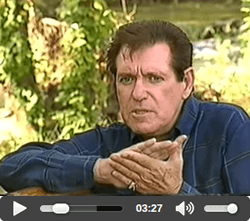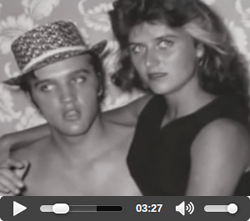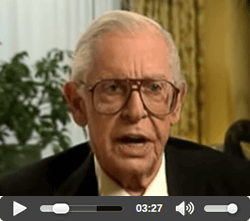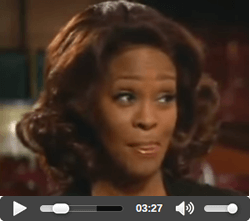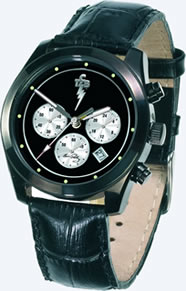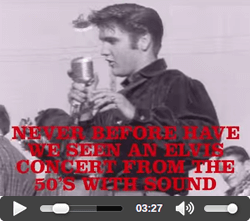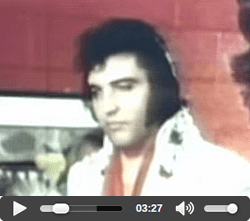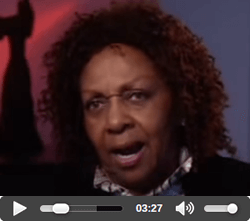Elvis Presley and Racism : The Ultimate, Definitive Guide
By: David Troedson
Source: Elvis Australia
December 18, 2014 - 8:01:00 PM
Elvis & Racism,
Elvis Articles,
By David Troedson
When the 'establishment' accused Elvis Presley of being vulgar, of being deliberately sexual, they did not mean this. This was the cover for what was really meant, what was really feared, and that was that Elvis would lead to equal rights and racial integration. And not just Elvis any white person singing rock 'n' roll. Carl Perkins was warned to not do his show. Elvis was simply the number one guy and therefore got the most attention.
Following his 'Milton Berle' show, Elvis was savaged by critics who described his leg-shaking, hip-swiveling performance as 'noxious' and his singing as 'caterwauling'. Often the criticism had a racist edge, since Elvis was singing what was considered 'black music'. One critic summed up his performance as 'the kind of animalism that should be confined to dives and bordellos'. A Catholic weekly ran its criticism under the banner, 'Beware of Elvis Presley'. Ilva Price, an African American now living in West Memphis, TN, recalled how her father, angry about rumours (later found by 'Jet' magazine to be fabricated), that Elvis had stolen 'their' music and was a racist, quickly turned off the radio when he noticed her daughter's reaction to his voice, then called him a 'cracker', a racial epithet as disgusting as any other ... : Boston Globe Interview by Renee Graham, published on August 11, 2002.
Sammy Davis Jr : 'I have a respect for Elvis and my friendship. It ain't my business what he did in private. The only thing I want to know is, 'Was he my friend?', 'Did I enjoy him as a performer?', 'Did he give the world of entertainment something?' - and the answer is YES on all accounts. The other jazz just don't matter'. 'Early on somebody told me that Elvis was black. And I said 'No, he's white but he's down-home'. And that is what it's all about. Not being black or white it's being 'down-home' and which part of down-home you come from'.
'On a scale of one to ten, I would rate Elvis eleven'.
James Brown and Elvis Presley were good friends and admired each others talents. James authored two books, and one contains this quote about Elvis: 'I wasn't just a fan, I was his brother. He said I was good and I said he was good; we never argued about that. Elvis was a hard worker, dedicated, and God loved him ... I love him and hope to see him in heaven. There'll never be another like that soul brother'.
James was was one of the celebrities who attended Elvis' funeral. George Klein : 'One of the first phone calls I remember receiving came from James Brown, who wanted to tell me how broken up he was over the news. He asked if he could come to the house during the private viewing'. 'I checked with Priscilla to make sure it was all right, and late in the afternoon James came up to join us - the first of many major artists to pay their respects. 'I remember being taken aback by how truly distraught James was ... Then he sat motionless in the corner of the living room for a long while before joining the rest of the mourners in the den. In his autobiography, Brown wrote, 'His death hit me very hard. When he died, I said, 'That's my friend, I have to go'.
Shortly after Elvis died, James Brown recorded Love Me Tender as the b-side of his hit record The Spank. Brown did this touching spoken intro: 'I want to talk about a good friend I had for a long time and a man I still love, Brother Elvis Presley. You know, if he were here right now, I'm sure he would say the same thing for me. I loved the man and he was truly the king of rock and roll. We've always had kind of a toss up. Elvis and I. The King of Rock And Roll and I'm the King of Soul. So I wanted to say this for the people, Elvis, and myself'.
 Love Me Tender : Tribute to Elvis by James Brown : 1978
Love Me Tender : Tribute to Elvis by James Brown : 1978
![]() Macromedia Flash Player 9.1+ required to play this audio. Apple iPad Compatible. If connection is slow, once downloading has completed, you can play it uninterrupted as many times as you like. Read more
Macromedia Flash Player 9.1+ required to play this audio. Apple iPad Compatible. If connection is slow, once downloading has completed, you can play it uninterrupted as many times as you like. Read more ![]() .
.
![]() Latest Audio and video updates : Audio courtesy of
Latest Audio and video updates : Audio courtesy of ![]() MP3 Elvis Audio Central.
MP3 Elvis Audio Central.
Elvis Presley and Racism

Elvis Presley & Sammy Davis Jr.
|
The headline: 'How Negroes Feel About Elvis'
It begins: ... 'As one of the most-debated subjects in the land, Elvis Presley arouses white-heat discussion everywhere. But among Negroes, the controversy over Elvis is even more explosive than among whites. Colored opinion about the hydromatic-hipped hillbilly from Mississippi runs the gamut from caustic condemnation to ardent admiration'.
'Some Negroes are unable to forget that Elvis was born in Tupelo, Mississippi, home town of the foremost Dixie race baiter, former Congressman Jon Rankin. Others believe a rumored crack by Elvis during a Boston appearance in which he is alleged to have said: 'The only thing Negroes can do for me is shine my shoes and buy my records'.
And there it is.
The first time ever that statement appeared in print, says Michael T. Bertrand, author of the book Race, Rock, and Elvis (2000, University of Illinois Press) and a Southern studies professor at the University of Mississippi in Oxford. 'Each time I teach a new class on popular music and Southern history, I still have African-American students come up after class and say, 'You know, I heard from my uncle what Elvis said'.
'So I eventually had to find where it came from'.
'All these years after Elvis' death, people still want to know how black people feel about Elvis Presley. Was he just another white Southern racist? Was he an impostor or worse, a thief? One simple lie, and those predisposed to believe it did. Some said he made the remark while in Boston. Elvis had never been to Boston. Others said they heard it on Edward R. Murrow's CBS TV show Person to Person. But after Elvis' manager Col. Tom Parker demanded an appearance fee, CBS balked and Elvis didn't go on the show.
Rejection of Integration
The true root of the 'Elvis Was a Racist' line of thinking is a distinctly modern rejection of integration, one of the ideals of the civil rights movement that we've chosen to blissfully ignore. There is a belief, among both blacks and whites, that black music is for blacks and any white man playing is guilty of some terrible misappropriation, and that this misappropriation is an outgrowth of the horrible sins committed against blacks by whites throughout our nation's history. There's no reason to 'debunk' this argument, because it is transparently foolish and absolutely racist, on both sides. For blacks to attempt to lock one side out of the racial dialogue is counterproductive and reactionary, and for whites to believe that only blacks should play 'black music' is a PC'd-up version of the Stepin Fetchit/minstrel mentality, plain and simple.
The investigation : Changing perceptions
Before we go further, lets make it clear, in the case of people saying Elvis was racist, we have no doubt that this is based on misunderstanding, by what they have been told, (as stated above) or because of jealousy. Now jealousy is understandable, through no fault of Elvis' he did benefit from the writing of black musicians, and his blending of different musical styles and the society of the times did stop a lot of African American artists prospering as they can do today. But that was not Elvis' fault, in fact it is to his credit (as many black musicians have stated and you can read below) that he was prepared to embrace a music forbidden by much of society, in fact often Elvis and other artists such as Carl Perkins where persecuted for singing the so called 'race' music and pressured by town authorities to not perform these songs, considered to be 'black music'.

Elvis Presley talks as two young reporters listen attentively backstage at the Fox Theatre : May 25, 1956.

Elvis Presley talks as two young reporters listen attentively backstage at the Fox Theatre : May 25, 1956.
From a very early age growing up in a poor Southern community Elvis spent much of his early years absorbing the music of local impoverished black communities like Shake Rag in Tupelo and later on the Beale Street area of Memphis. This was not normal behavior, but then Elvis was not your average guy. Elvis, unlike most white teenagers would delight in attending the colored East Trigg Baptist Church where he would hear local black gospel music. Elvis was not guided by color but by what he liked and felt good with.
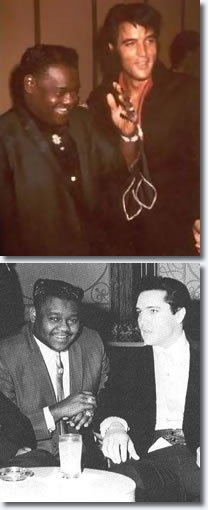
Fats Domino & Elvis Presley.
|
Soon after the Sepia rumor started, Elvis broke his media silence for an exclusive interview in Jet, another magazine targeted at black readers.
Knowing the dubious reputation of Sepia, Louie Robinson, the black associate editor of the black-owned JET magazine, decided to investigate the authenticity of the alleged statement and report to his readers.
'Tracing the rumored racial slur to its source was like running a gopher to earth', Robinson later wrote. 'No matter what hole it dived back in, it popped out of another one'. Running down Elvis was easier. In the summer of 1957, Robinson interviewed the star in his Hollywood dressing room.
The Jet article of 1957 further confirmed what friends and associates knew about Elvis all along: He truly loved and respected black musicians.
In fact the rumor should have stopped then and there since, on the set of Jailhouse Rock, Elvis was directly challenged about the statement by reporter Louie Robinson from the prominent black newspaper 'Jet'.
Elvis honestly replied, 'I never said anything like that, and people who know me know that I wouldn't have said it'. 'A lot of people seem to think I started this business', he told Jet. 'But rock n roll was here a long time before I came along'. 'Nobody can sing that kind of music like colored people'.
'Let's face it: I can't sing like Fats Domino can. I know that'.
Robinson then talked with some blacks who knew Elvis and included their remarks in his JET article. 'He faces everybody as a man', said Dudley Brooks, a Los Angeles piano player who worked on Elvis Presley's recording sessions. 'I never heard of the remark, but even so I can't imagine Presley saying that, not knowing him the way I do'.
Back in Tupelo, Dr. W.A. Zuber told Robinson, 'I knew him when he was a kid. He used to play the guitar and go around with quartets and to Negro 'sanctified' meetings. He lived near the colored section, and people around here say he's one of the nicest boys they ever knew. He just doesn't impress me as the type of person who would say a thing like that.
Indeed, in heavily segregated Memphis of that day, Presley was regularly seen at black-only events. In June 1956, a Memphis newspaper reported that Elvis had attended the Memphis Fairgrounds amusement park on a designated 'colored night'. The next month, he attended black radio station WDIA's charity event, featuring all-black talent, including Ray Charles, B.B. King, the Moonglows, and DJ Rufus Thomas. (More on this below).

As Elvis left the Hudson Theater on July 1, 1956 his fans reached out for an autograph and to touch their idol.
B.B. King defends Elvis
In a Sepia article, B.B. King supported Elvis. 'What most people don't know', stated King, 'is that this boy is serious about what he's doing. He's carried away by it. When I was in Memphis with my band, he used to stand in the wings and watch us perform. As for fading away, rock and roll is here to stay and so, I believe, is Elvis. He's been a shot in the arm to the business and all I can say is 'that's my man'.
In his 1957 investigative article in JET, Louie Robinson concluded that not only did blacks know Presley; he also knew blacks. 'I always wanted to sing like Billy Kenny of the Ink Spots', Robinson quoted Elvis. 'I like that high, smooth style'. When Robinson asked about the origin of his 'earthy, moaning baritone' singing voice, Presley responded, 'I never sang like this in my life until I made that first record - That's Alright, Mama. I remembered that song because I heard Arthur (Big Boy) Crudup sing it and I thought I would like to try it'.
Robinson's Conclusion
Robinson did confirm that Presley was making more money singing rhythm and blues than black performers of the day. While Elvis' nearest competitor, Fats Domino, was expected to earn $700,000 in 1957, Robinson suggested Elvis would earn twice that much. And as for the accusation that Presley was making buckets full of money off songs written by blacks, who earned very little for their songwriting talents, Robinson quoted Otis Blackwell, writer of two huge Presley hits 'Don't Be Cruel' and 'All Shook Up'. Without giving specific numbers, Blackwell confirmed, 'I got a good deal. I made money. I'm happy'. Elvis - 'I always liked that kind of music'.
Robinson was impressed with Presley's honest evaluation of his contribution to the genre.
'A lot of people seem to think I started this business', Elvis explained, 'but rock 'n' roll was here a long time before I came along. Nobody can sing that kind of music like colored people. Let's face it; I can't sing it like Fats Domino can. I know that. But I always liked that kind of music.'
As for the 'shine rumor', it was easy for Robinson to discard the Sepia magazine allegation that Elvis made the remark in Boston, since the twenty-two-year-old singer had never been in that city. Robinson had also heard, by 'word of mouth', that Elvis made the infamous comment to Edward R. Murrow on his CBS-TV show. Since records verified that Presley had never appeared on 'Person to Person', Robinson ultimately concluded that no proof existed that Elvis had ever made the alleged racial statement anywhere.
Thus, JET magazine, highly respected among American blacks in 1957, not only cleared Elvis of voicing the racist comment, but also portrayed him as a young white man who fostered race equality in both his professional and private life. Elvis probably thought he had put the rumor to rest for good. Little did he know that all these years after his death it would continue to live on as an urban legend. The idea of Elvis racism would not die so easily.
Musicologists scoff at talk of a racist Elvis
A dirt-poor outcast at segregated Humes High School, he wore pink shirts and pomaded hair like the folks he admired down on Beale Street. He listened religiously to Memphis's black radio station WDIA and became friends with then-disc jockey B.B. King, who later defended him in Sepia: 'What most people don't know is that this boy is serious about what he's doing. He's carried away by it. When I was in Memphis with my band, he used to stand in the wings and watch us perform. As for fading away, rock and roll is here to stay and so, I believe, is Elvis. He's been a shot in the arm to the business and all I can say is 'that's my man'.
African-American Newspapers Declare Elvis a Hero
'Down in Tupelo, Mississippi', Elvis told a white reporter for 'The Charlotte Observer' in 1956, he used to listen to Arthur Crudup, the blues singer who originated That's All Right, Elvis' first record. Crudup, he said, used to 'bang his box the way I do now, and I said if I ever got to the place where I could feel all old Arthur felt, I'd be a music man like nobody ever saw'. It was statements like these that caused Elvis to be seen as something of a hero in the black community in those early years. In Memphis the two African-American newspapers, 'The Memphis World' and 'The Tri-State Defender', hailed him as a 'race man' - not just for his music but also for his indifference to the usual social distinctions. [Elvis was truly a man ahead of his time].
Photos
We include many photos of Elvis with various black artists, all seem to show a young white Southerner -- gasp! -- having fun with blacks! This could be said to be purely circumstantial, of course, but the poses taken and comradely obvious in these snapshots do not seem to point to some sort of deep-seated racism on Presley's part. You will see in the photos though that the friendships where long lasting, with photos of Elvis with Sammy Davis Jr from the 1950s to 1969 for example. And possibly the best two examples lie directly below.
Elvis was there when it mattered : 'cracking Memphis's segregation laws'
Firstly, in June 1956, 'The Memphis World' newspaper reported, 'the rock 'n' roll phenomenon cracked Memphis's segregation laws' by attending the Memphis Fairgrounds amusement park 'during what is designated as 'colored night'. On December 7, 1956 Elvis also attended the otherwise segregated WDIA black radio station's annual fund-raiser for 'needy Negro children' at Memphis' Ellis Auditorium.
On this December night, Elvis performed alongside some of his own heroes, Ray Charles, B.B King & Rufus Thomas. There was no doubt that Elvis was seen as a champion in the black Memphis community and his concert audiences were certainly not all white as is often believed. Although Elvis' recording contract did not permit him to perform at the fund-raiser for radio station WDIA, he set off a sensation. The Pittsburgh Courier described the reaction that night as, 'A thousand black, brown and beige teen-age girls in the audience blended their alto and soprano voices in one wild crescendo of sound that rent the rafters ... and took off like scalded cats in the direction of Elvis Presley'. (All from just a brief emergence from behind the curtain!!).
B.B. King
The radio station called itself the 'Mother Station of the Negroes'. In the aftermath of the event, a number of Negro newspapers printed photographs of Elvis with both Rufus Thomas and B.B. King ('Thanks, man, for all the early lessons you gave me', were the words The Tri-State Defender reported he said to Mr. King).
When he returned to the revue the following December (December 6, 1957), a stylish shot of him 'talking shop' with Little Junior Parker and Bobby 'Blue' Bland appeared in Memphis's mainstream afternoon paper, 'The Press-Scimitar', accompanied by a short feature that made Elvis' feelings abundantly clear. 'It was the real thing', he said, summing up both performance and audience response. 'Right from the heart'.

Elvis Presley and B.B. King backstage at the WDIA Goodwill Revue.
Ellis Auditorium on December 7, 1956. Elvis attends with George Klein. Photos by Ernest Withers.

Elvis backstage at WDIA Goodwill Revue, Memphis, December 7, 1956.
Below, when Elvis returned to the revue the following December (December 6, 1957), a stylish shot of him 'talking shop' with Little Junior Parker and Bobby 'Blue' Bland appeared in Memphis's mainstream afternoon paper, 'The Press-Scimitar', accompanied by a short feature that made Elvis' feelings abundantly clear. 'It was the real thing', he said, summing up both performance and audience response. 'Right from the heart'.

Little Junior Parker, Elvis Presley, Bobby Blue Bland at the WDIA Goodwill Revue December 7, 1957.
Little Junior Parker (1932-1971) was a successful and influential Memphis blues singer and musician. He recorded the song Mystery Train in 1953, two years before Elvis made it one of his classic Sun singles.
Who's the real king?
While Elvis rocketed to stardom, resentment grew among talented musicians whose similar-sounding records weren't getting the same play. The hip swiveling that merely disgusted conservative whites amounted to theft for blacks. More than one player laid claim to Elvis' gimmicks. Blues shouter Wynonie 'Mr. Blues' Harris told Sepia: 'I originated that style 10 years ago. The current crop of shouters are rank impostors. They have no right to call themselves the kings of rock and roll. I am the king of rock and roll'. In the Atlanta Journal-Constitution, guitarist Calvin New born said Elvis hung out in a black bar outside Memphis where he played. 'He would sit there and watch me every Wednesday and Friday night', he said. 'I'd wiggle my legs and swivel my hips and make love to the guitar'. In 1956, the Amsterdam News said Elvis had 'copied Bo Diddley's style to the letter'. Flamboyant singer Little Richard pointed out stinging economic disparities: 'Elvis was paid $25,000 for doing three songs in a movie and I only got $5,000, and if it wasn't for me, Elvis would starve'.
Theft
One of the favorite arguments of the anti-Elvis cadre is that one of his most memorable recordings, Hound Dog, was 'stolen' from Big Mama Thornton, an incredibly talented black blues singer who recorded her sultry, simmering version in 1953. Contrary to popular belief, Hound Dog was not some long-lost song of the back bayou, but a Lieber and Stoller composition. So, technically, if you follow this line, both Elvis and Big Mama Thornton 'stole' the song from two white, New York Jews. For shame!
I can't remember a time when covering a recording by another artist was considered 'stealing' -- this would mean that when Blind Willie McTell recorded Dying Crapshooter's Blues he was maliciously stealing (the white) Irving Mills's St. James Infirmary. For that matter, both the American white Mills and the American black McTell 'stole' the song from the old British folk ballad The Unfortunate Rake, popular in the late 1700s.
This argument falls apart upon even a cursory investigation, and with it the entire 'Elvis stole the black man's sound' argument put forth by Mos Def, Chuck D., and hundreds of guilty white hippies over the last fifty years. There is no 'stealing' in terms of folk music: the stew of racial, social, and (most importantly) aural traditions that constitutes American roots music cannot be reduced to simple black and white, moralistic terms.
[Jackie Wilson : 'A lot of people have accused Elvis of stealing the black man's music, when in fact, almost every black solo entertainer copied his stage mannerisms from Elvis'.]
Asked to characterize his singing style when he first presented himself for an audition at the Sun recording studio in Memphis, Elvis said that he sang all kinds of music - 'I don't sound like nobody'. This, as it turned out, was far more than the bravado of an 18-year-old who had never sung in public before. It was in fact as succinct a definition as one might get of the democratic vision that fueled his music, a vision that denied distinctions of race, of class, of category, that embraced every kind of music equally, from the highest up to the lowest down.
But Elvis also couldn't change the times
In the same month of the Sepia article, singer Nat King Cole was infamously attacked onstage by five racists during a concert in Birmingham. The 3,000 white audience members booed the assailants, but did not intervene during the beating, which the men claimed was to protest 'bop and Negro music'.
Well actually Elvis did, he started a revolution, it just took some time, and is still in progress. Elvis did as much as anyone to progress integration, simply by integrating music and defying the establishment.
When the 'establishment' accused Elvis Presley of being vulgar, of being deliberately sexual, they did not mean this. This was the cover for what was really meant, what was really feared, and that was that Elvis would lead to equal rights and racial integration. And not just Elvis any white person singing rock 'n' roll. Carl Perkins was warned to not do his show. Elvis was simply the number one guy and therefore got the most attention.
'Had everything else been the same -- the moves, the clothes, the look -- but Elvis had been a black man, would white America in the '50s have embraced him with the same enthusiasm?' asks Patricia Turner, co-author (with Gary Alan Fine) in the book 'Whispers on the Color Line: Rumor and Race in America'. 'The answer is probably no. And there's a lot of resentment about that'.
What Elvis believed
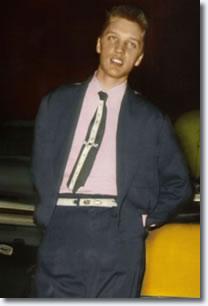
Elvis Presley 1954
|
But the singer's move to Hollywood struck many as an abandonment of his musical roots. Credibility with struggling black musicians faded when Elvis jumped to the big screen. 'When he first started out in his career, Presley blurred racial lines', Bertrand said. 'But later on in his career he became, for lack of a better term, whiter. When he tried to become more middle class, he lost what people perceived were his black characteristics'. After Elvis' death in 1977, white America's continued idolization of the singer didn't ride well with many black people who, particularly during the 1980s, saw their contributions to pop music overlooked and underexposed.
Junior Parker

Junior Parker and Elvis Presley Hollywood Movie Set, 1960s.
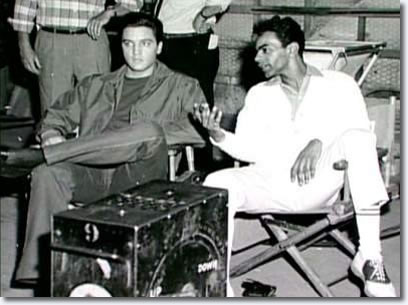
Johnny Mathis visits Elvis Presley on the set of 'Wild In The Country'.
Continued resentment
In 1990, anti-Elvis sentiment exploded from black artists. The group Living Colour lashed out against the music industry through their song Elvis Is Dead: 'I've got a reason to believe / We all won't be received at Graceland'. Raging against gang violence, poverty and inequality, rapper Chuck D of Public Enemy shouted what have become some of the group's most enduring lyrics. 'Elvis was a hero to most / but he didn't mean (expletive) to me you see / Straight up racist, that sucker was simple and plain / Mother (expletive) him and John Wayne / Cause I'm black and I'm proud, I'm ready and hyped plus I'm amped / Most of my heroes don't appear on no stamps'. Recently, Chuck D explained that his attack was against the Elvis whose roots were whitewashed by his legacy. 'The Elvis that died wasn't the same Elvis that was coming up', Chuck D said. 'They said he was king. Based on who and what? Based on the quality of the people judging or the quality of his music? What does 'King of Rock and Roll' mean growing up in a black household? My Chuck Berry records are still in my house. Little Richard is still in the house. Otis Redding and James Brown. The King of what?'
Gospel singer Mahalia Jackson, Elvis Presley and co-star Barbara McNair

Gospel singer Mahalia Jackson, Elvis Presley and Change Of Habit co-star Barbara McNair.
Barbara McNair recalls the visit of Mahalia Jackson : 'Elvis and I were sitting there together and Mahalia came on the set and she asked Elvis if he would participate in a fund-raiser that she was going to organize. Elvis was so gracious, 'Oh, Mrs Jackson, I am so happy to meet you, I would love to do it, but I still have to ask the Colonel'. So after she left, he said to me, 'I'll never do it, the Colonel won't let me', but he was so gracious to her, he knew all the

|
Barbara McNair attended Elvis' concert on August 26, 1969 DS. After introducing the band, Elvis had Barbara McNair stand and introduces her as 'a young lady that I just go through making a picture with called 'Change Of Habit', and I found her to be one of the nicest, warmest, lovingest people I've ever met'. When audience members complain they could not see her, he has the lights turned back on so she can stand up again.
Billy Ward and Elvis Presley

Billy Ward (of Billy Ward and The Dominoes) and Elvis Presley.
Above, it was while watching Billy Ward and The Dominoes in Las Vegas that Elvis first saw Jackie Wilson, a member of the group at that time, perform. Elvis talks about Jackie in glowing terms during the famed 'Million Dollar Quartet Session' at Sun Studios on December 4, 1956. Although Elvis did not know his name then, they became good friends.
Rufus Thomas, Jr

Rufus Thomas, Jr and Elvis Presley.
Rufus Thomas, Jr. (March 27, 1917 – December 15, 2001) was an American rhythm and blues, funk and soul singer and comedian from Memphis, Tennessee, who recorded on Sun Records in the 1950s.
Losing perspective
So why didn't the rumor die? Why did it continue to find common acceptance up to, and past, the point that Chuck D of Public Enemy could declare in 1990, 'Elvis was a hero to most... straight-up racist that sucker was, simple and plain'? Chuck D has long since repudiated that view for a more nuanced one of cultural history, but the reason for the rumor's durability, the unassailable logic behind its common acceptance within the black community rests quite simply on the social inequities that have persisted to this day, the fact that we live in a society that is no more perfectly democratic today than it was 50 years ago. As Chuck D perceptively observes, what does it mean, within this context, for Elvis to be hailed as 'king', if Elvis's enthronement obscures the striving, the aspirations and achievements of so many others who provided him with inspiration?
Elvis would have been the first to agree. When a reporter referred to him as the 'king of rock 'n' roll' at the press conference following his 1969 Las Vegas opening, he rejected the title, as he always did, calling attention to the presence in the room of his friend Fats Domino, 'one of my influences from way back'. The larger point, of course, was that no one should be called king; surely the music, the American musical tradition that Elvis so strongly embraced, could stand on its own by now, after crossing all borders of race, class and even nationality.
Memphis, Elvis' kingdom, is a near perfect reflection of the problems with the music industry and society at large. The Bluff City is known for its blues. Known for its soul. Known for BB King, Isaac Hayes, Aretha Franklin, Rufus and Carla Thomas, Booker T. & the MGs, Al Green and one of the most influential recording studios of all time: Stax. While Elvis shrines were popping up all over town, black contributions were being dismantled. The Stax recording studio was demolished in 1989. The same fate nearly befell one of the Civil Rights era's most important landmarks, the Lorraine Motel, where Dr. Martin Luther King Jr was assassinated. As much as singer Mavis Staples loved Elvis and his music, his unbridled legacy bothered her. 'What helped Elvis was that when he did interviews, he would tell that he got it from blacks', Staples said. 'Now one thing that I could say for myself was that when I came back to Memphis after Stax closed, maybe about five years later, I only saw Elvis. And that's when I said, 'wait a minute'. Something should be out here about Stax. Just because it folded doesn't mean it didn't happen. And the people of Memphis should have remembered all of the music'.
Soul singer Isaac Hayes, back into the limelight after his stint as South Park's Chef, said he understands how Elvis' memory became entangled in broader issues of race. 'Elvis was due the respect he had. No animosity. No sour grapes. Elvis was the man', he said. 'The thing was that we didn't get what we (the black artists) deserved. Ignorance is one of the main things. Racism? It's one of the factors. I would say it took the whole world outside of Memphis to recognize what a treasure black Memphis had'.
Regaining perspective
In the past 25 years, the world has improved for black people not only in the music industry, but in other areas as well. Again, Memphis exemplifies this. Graceland isn't the only tourist attraction anymore.
The Rock and Soul Museum traces the history of the blues. The National Civil Rights Museum (which rescued the Lorraine Motel) depicts the 20th Century's great American struggle. And the Stax Museum of American Soul Music is on the original site. Folks in the music industry now have more respect for black artists, says Chuck D, including the new artists who seem to be walking in Elvis' shoes.
Muhammad Ali

Elvis Presley and Muhammad Ali - February 14, 1973.
Muhammad Ali : 'Elvis was my close personal friend. He came to my Deer Lake training camp about two years before he died. He told us he didn't want nobody to bother us.
He wanted peace and quiet and I gave him a cabin in my camp and nobody even knew it. When the cameras started watching me train, he was up on the hill sleeping in the cabin. Elvis had a robe made for me. I don't admire nobody, but Elvis Presley was the sweetest, most humble and nicest man you'd want to know'.

Muhammad Ali wearing the robe given by Elvis. March 31, 1974.
![]() Elvis and Ali: Two Sides of the Same Coin
Elvis and Ali: Two Sides of the Same Coin
If ever there were a modern parallel, white rapper Eminem is a shoo-in. Like Elvis, Eminem grew up poor and honed his gift by studying black music and culture. Like Elvis, he's popular with whites. Like Elvis, he's become one of the most successful in the business. And like Elvis, Eminem has caught the acting bug.
Eminem doesn't hesitate to point out the irony on his latest album The Eminem Show, produced by rapper and mentor Dr. Dre. 'I'm not the first king of controversy / I am the worst thing since Elvis Presley / To do black music so selfishly / And use it to get myself wealthy (Hey) / There's a concept that works'.
Chuck D, a founding father of hip-hop and pop musicologist, said that accepting Elvis, and by extension other white crossover artists, might be easier for black Americans now that black artists are getting more credit and exposure. Several years ago, the Fox TV network sent him to Graceland to do a black-perspective news story about Elvis. The assignment opened his eyes. 'Elvis had to come through the streets of Memphis and turn out black crowds before he became famous', Chuck D said. 'It wasn't like he cheated to get there. He was a bad-ass white boy. Just like Eminem is doing today. The thing about today is that Eminem has more respect for black artists and black people and culture today than a lot of black artists themselves. He has a better knowledge where it comes from. Elvis had a great respect for black folk at a time when black folks were considered niggers, and who gave a damn about nigger music?'
Despite the efforts by historians, musicians and corporate executives, getting the word out means reaching one person at a time. Hip-hop singer Mary J. Blige apologized after singing Blue Suede Shoes on VH1's Divas Live. She told the Atlanta Journal-Constitution, 'I prayed about it (performing the song) because I know Elvis was a racist. But that was just a song VH1 asked me to sing. It meant nothing to me. I didn't wear an Elvis flag. I didn't represent Elvis that day. I was just doing my job like everybody else'. [This makes her a racist!!!!]
Jackie Wilson
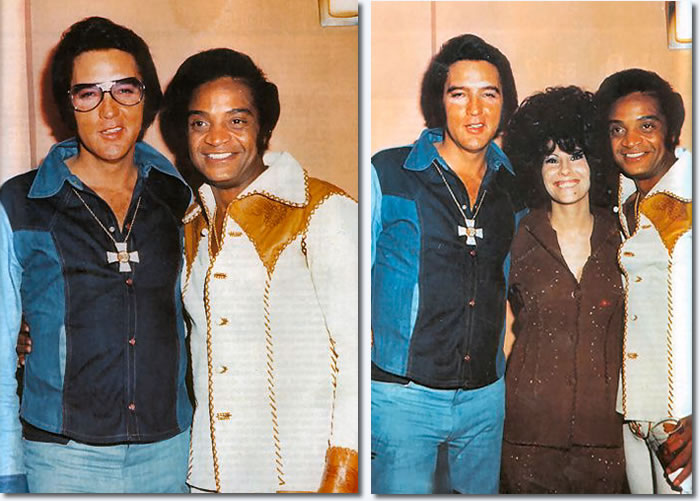
Jackie Wilson & Elvis Presley : August 20, 1974.
Before his death, Rufus Thomas gave an interview to the TV program American Routes, which aired on WKNO. The former WDIA disc jockey and legendary Stax singer said: 'Well a lot of people said Elvis stole our music. Stole the black man's music. The black man, white man, has got no music of their own. Music belongs to the universe'. Thomas went on to say that he played Elvis' tunes on the radio until the program manager told him to stop because black people didn't want to hear them. Then Elvis showed up at a WDIA fund-raising event for black handicapped children. 'When Elvis wiggled that leg, the crowd went nuts. He walked right off the stage and people were storming that stage. The next day I started back to playing Elvis again. Going to show you that no one person can tell you what another group might like'.
While visiting Memphis, Tennessee, in the spring of 1957, Ivory Joe Hunter was invited by Elvis Presley to visit Graceland. The two spent the day together, singing 'I Almost Lost My Mind' and other songs together. Hunter commented, 'He is very spiritually minded ... he showed me every courtesy, and I think he's one of the greatest'. Joe was a prolific songwriter. Some estimates say that he has written more than 7,000 songs. Elvis Presley put two of them into the top twenty: ![]() My Wish Came True and
My Wish Came True and ![]() Ain't That Loving You Baby.
Ain't That Loving You Baby.
Elvis and Roy Hamilton
During Elvis' 1969 Memphis recording sessions at American Sound Studios, Elvis was thrilled to discover that his boyhood idol Roy Hamilton would be working at the same studio during the day (Elvis' sessions were usually at night) and Elvis presented Roy with a beautiful new song 'Angelica' that he was going to record himself. The song turned out to be the single released from the session. Sadly it would be Hamilton's last as he suffered a stroke latter that year. It was a Roy Hamilton R&B tune, 'Without A Song' that Elvis famously quoted for his acceptance speech at the U.S. Jaycees' Ten Outstanding Young Men of 1970 dinner.
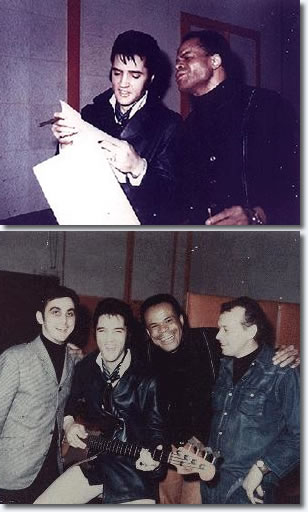
Roy Hamilton and Elvis Presley, American Studios, 1969.
 Quotes about Elvis
Quotes about Elvis
Muhammad Ali : 'Elvis was my close personal friend. He came to my Deer Lake training camp about two years before he died. He told us he didn't want nobody to bother us.
He wanted peace and quiet and I gave him a cabin in my camp and nobody even knew it. When the cameras started watching me train, he was up on the hill sleeping in the cabin. Elvis had a robe made for me. I don't admire nobody, but Elvis Presley was the sweetest, most humble and nicest man you'd want to know'.
Jackie Wilson : 'A lot of people have accused Elvis of stealing the black man's music, when in fact, almost every black solo entertainer copied his stage mannerisms from Elvis'. In Elvis Presley, Last Train To Memphis: The Rise of Elvis Presley, author Peter Guralnick describes the meeting between the two backstage at The Trip: 'In between sets Elvis finally got the opportunity to meet Jackie and express his unreserved admiration for Wilson's talent. With all he had going for him, Elvis said, he could see no reason why Jackie shouldn't be the number one singer in the world'. It was a wonderful tribute which Jackie would have appreciated. Jackie's drummer Jimmy Smith recalls; 'Elvis came to the club in a white suit and a white Rolls Royce. I said, 'That man's got style, ain't he?' Jackie said of Elvis' visit; 'Elvis did me a nice favour once. I was in Hollywood, California, playing a club called The Trip and we were having a little difficulty getting people to come out at that particular time. So he came out twice for me and, well, you couldn't get in. They said if Elvis goes, well ... hey, let's go'.
Elvis invited Jackie out to the movie set to see him. Jackie took up the offer, visiting Elvis at MGM, where they had photos taken like two old friends. Elvis signed the photo for Jackie, writing 'Jackie, you have a friend forever, Elvis'. Jackie carried the photo everywhere thereafter; it was a treasure. [When Jackie had a stroke in 1975 leaving him unable to perform and hospitalised, Elvis covered a large proportion the medical bills.]

Jackie Wilson and Elvis Presley.
Sonny West, who was a close friend of Elvis' and one of his inner circle for many years, said; 'Elvis loved Billy Ward, Billy Daniels, Billy Eckstine, the Inkspots - he loved all of them. He took something from all of them and it all came together in his voice at different times. Jackie was rhythm and blues; Elvis would tell you that the influence of gospel singing and rhythm and blues helped form his style of singing. And what came out was rock 'n' roll ... somehow they got together and you had rock 'n' roll.
James Brown : 'I wasn't just a fan, I was his brother. He said I was good and I said he was good; we never argued about that. Elvis was a hard worker, dedicated, and God loved him. Last time I saw him was at Graceland. We sang Old Blind Barnabus together, a gospel song. I love him and hope to see him in heaven. There'll never be another like that soul brother'. [James was the first entertainer to arrive at Elvis' funeral.]
James Brown : 'We were friends for a long time, for twenty years. And he told me, he'd ride around Memphis around the streets he'd come up in, all alone at night. Ride around on his motorcycle when he was sure the rest of the world was asleep, just kind of hauntin' them places he hung around in as a kid. He was a country boy'. And as only James Brown could say, 'Elvis and I are the only true American originals. I love him and hope to see him in heaven. There'll never be another like that soul brother'. [James Brown was so moved by Elvis' death that he requested, and was allowed, time alone with Elvis as he lay in his coffin at Graceland.]
Al Green : 'Elvis had an influence on everybody with his musical approach. He broke the ice for all of us'.
Eddie Murphy : 'That's my idol, Elvis Presley. If you went to my house, you'd see pictures all over of Elvis. He's just the greatest entertainer that ever lived. And I think it's because he had such presence. When Elvis walked into a room, Elvis Presley was in the f***ing room. I don't give a f*** who was in the room with him ...
Question to Eddie Murphy by Rolling Stone Magazine November 9, 2011.
Have you had to defend your Elvis fandom to African-Americans who think he was racist?
Eddie Murphy : 'The big myth in the African-American community was that he said that the only thing black folks could do for him was shine his shoes and buy his records. People liked him when they were young, then said, 'I don't like him because he said that', and I said, 'He never even said that'.
 B.B. King :'I remember Elvis as a young man hanging around the Sun studios. Even then, I knew this kid had a tremendous talent.
B.B. King :'I remember Elvis as a young man hanging around the Sun studios. Even then, I knew this kid had a tremendous talent.
He was a dynamic young boy. His phraseology, his way of looking at a song, was as unique as Sinatra's. I was a tremendous fan, and had Elvis lived, there would have been no end to his inventiveness'.
B.B. King : 'I knew Elvis before he was popular. He used to come around and be around us a lot. I can remember once or twice when we met down at Club Handy on Beale Street. Elvis at heart was very religious and I think that throughout his career he couldn't help but let it come out and you can hear it'.
Sam Phillips : 'The lack of prejudice on the part of Elvis Presley had to be one of the biggest things that could have happened to us'.
Dudley Brooks : a Los Angeles piano player who worked on Presley recording sessions. 'He faces everybody as a man'. 'I never heard of the remark, but even so I can't imagine Presley saying that, not knowing him the way I do'.
Little Richard : 'Oh I love Elvis! He was my baby. Elvis only took, Elvis only took his um, sense of dressin' and the bass, and the um, oh Elvis was alright I loved him.
Elvis was an integrator. Elvis was a blessing. They wouldn't let black music through. He opened the door for black music'. 'Elvis was an integrator. Elvis was a blessing'.

Sammy Davis Jr visits Elvis Presley on the set of King Creole 1958.

Sammy Davis Jr with Elvis Presley, backstage, Opening Night 1969.

Sammy Davis Jr with Elvis Presley, backstage, Opening Night 1969.
Sammy Davis Jr
'I have a respect for Elvis and my friendship. It ain't my business what he did in private. The only thing I want to know is, 'Was he my friend?', 'Did I enjoy him as a performer?', 'Did he give the world of entertainment something?' - and the answer is YES on all accounts. The other jazz just don't matter'. 'Early on somebody told me that Elvis was black. And I said 'No, he's white but he's down-home'. And that is what it's all about. Not being black or white it's being 'down-home' and which part of down-home you come from'.'On a scale of one to ten, I would rate Elvis eleven'.

Sammy Davis Jr with Elvis Presley, backstage, Opening Night 1969.
Lionel Rose: 'I was punching a heavy bag in a gym in L.A., and I hear a voice sing out, 'Hey, Lionel! What's doin'?' And it was Elvis himself'. 'I was in awe of him, but he said he was in awe of me'.
Lionel Rose and Elvis Presley

Lionel Rose and Elvis Presley meet on the set of The Trouble With Girls 1969.
Chuck Berry : 'Describe Elvis Presley? He was the greatest who ever was, is, or will ever be'.
Cissy Houston : 'Elvis loved gospel music. He was raised on it. And he really did know what he was talking about. He was singing Gospel all the time - almost anything he did had that flavour ...'
'You can't get away from what your roots are'.
Ernest Withers : He was a mild tempered, quiet, nice guy. He treated everyone the same. There have been rumors about him, saying that he said 'The only thing blacks can do for me is shine my shoes'. Now, I don't believe that. I never saw him act in anyway like that'. 'I overheard one of Elvis' friends at the time ask Elvis 'Why do you call him 'mister' -- he's just a barbecue guy?' Elvis looked at him and said 'He's a man'. 'That', Withers says, 'Was the humility in his temperament'. 'Elvis was a great man and did more for civil rights than people know. To call him a racist is an insult to us all'.
Comment on this article Here
Jake Hess, the incomparable lead singer for the Statesmen Quartet and one of Elvis' lifelong influences, pointed out: 'Elvis was one of those artists, when he sang a song, he just seemed to live every word of it. There's other people that have a voice that's maybe as great or greater than Presley's, but he had that certain something that everybody searches for all during their lifetime'.
To do justice to that gift, to do justice to the spirit of the music, we have to extend ourselves sometimes beyond the narrow confines of our own experience, we have to challenge ourselves to embrace the democratic principle of the music itself, which may in the end be its most precious gift.
Jim Brown with Elvis Presley
They've had great admiration for each other for years, but recently Jim Brown, the fabulous gridiron hero and currently western actor, dropped in on Elvis Presley, and they had a long visit between scenes of Roustabout which stars Presley. Big Jim is currently working in Rio Conchos which stars Richard Boone.

Jim Brown with Elvis Presley.
![]() James Brown and Elvis Presley
James Brown and Elvis Presley
![]() Elvis Presley and Muhammad Ali
Elvis Presley and Muhammad Ali
![]() Elvis Presley and Muhammad Ali : Two Sides of the Same Coin
Elvis Presley and Muhammad Ali : Two Sides of the Same Coin
![]() Elvis Presley and Sammy Davis Jr
Elvis Presley and Sammy Davis Jr
![]() Jackie Wilson and Elvis Presley
Jackie Wilson and Elvis Presley
![]() Lionel Rose and Elvis Presley
Lionel Rose and Elvis Presley
![]() How Did Elvis Get Turned into a Racist? - By Peter Guralnick
How Did Elvis Get Turned into a Racist? - By Peter Guralnick
![]() Elvis' musical style, as a musician and impact as a vocalist and stage performer
Elvis' musical style, as a musician and impact as a vocalist and stage performer
![]() Ernest Withers : Eye on Elvis : Camera Captured Pictures Of Early Elvis
Ernest Withers : Eye on Elvis : Camera Captured Pictures Of Early Elvis
![]() Elvis Presley and Stephanie Spruill back stage at Ceasers Palace
Elvis Presley and Stephanie Spruill back stage at Ceasers Palace
![]() Eddie Murphy on Racism and Elvis
Eddie Murphy on Racism and Elvis
![]() How Elvis Fought Racism, Ethnic Discrimination (By an Arab-American, 2007)
How Elvis Fought Racism, Ethnic Discrimination (By an Arab-American, 2007)
Michael Saba : Arab News : Ask anybody in Memphis who knew Elvis and they will tell you that he was a nice polite young man who had great respect for his parents and friends. He also fought quietly against racial and ethnic discrimination. He was very patriotic and extremely generous with his money, particularly for humanitarian causes that related to Memphis. For example, Elvis was regular contributor to the American Lebanese Syrian Associated Charities, ALSAC, the fund-raising arm for St. Jude Children's Research Hospital in Memphis. This hospital is the premier children's cancer hospital in the world and was founded by Americans of Arab descent in honor of their Arab-American heritage. All children treated at St. Jude are treated at no cost to the parent or child. Farid's father was one of the founders of ALSAC and the hospital. He will also be remembered as someone who supported humanitarian causes that honored Arab-American heritage.
Was Elvis A Racist?
Shortly after Elvis died, James Brown recorded Love Me Tender as the b-side of his hit record The Spank. Brown did this touching spoken intro: 'I want to talk about a good friend I had for a long time and a man I still love, Brother Elvis Presley. You know, if he were here right now, I'm sure he would say the same thing for me. I loved the man and he was truly the king of rock and roll. We've always had kind of a toss up. Elvis and I. The King of Rock And Roll and I'm the King of Soul. So I wanted to say this for the people, Elvis, and myself'.
Brown then sings Love Me Tender. Was Elvis a racist? No way.
But we hope we have explained some of why some people like to claim he is.
![]() Comment on this article Here
Comment on this article Here
![]() Remarkable stats for our Elvis Presley and Racism : The Ultimate, Definitive Guide
Remarkable stats for our Elvis Presley and Racism : The Ultimate, Definitive Guide
Feedback
Comments : Highest regards to the Author. There is a lot of work here.
It is also a very fine read.
Thank you. I continue to be very proud of our site. Angela Greenham [Australia]
Comments : Congratulations on your article, Elvis Presley and Racism. This was the most all-encompassing and definitive article I have ever read on this subject. Strangely, the rumour does still persist, but I have always known Elvis was not racist. Thank you for the wonderful job you have done in writing this article.
Linda Sukla [United States]
Comments : Really nice article. I do believe Elvis had genuine respect for people regardless of their colour, and that's one of the features I most admire in him. Maria Carvalho [Brazil]
Comments : I remember reading a article years ago when Elvis was to perform in the Houston Asterdome. There was an issue of the management with Elvis's backup singers the Sweet Inspirations. Elvis said very sternly if they can't perform I won't perform. I know that Elvis Presley was no racist. Daniel Craycraft
Comments : David ... a very comprehensive piece on a perplexing myth. I really enjoyed your article. It reminds me, that I had been personally challenged and confronted by this very myth .... in the Operating Room where I worked for 47yrs. My OR room was known as 'Graceland 2'... by many folks, because, if you walked into my room ... Elvis would most likely be singing!! One day, about 6 or 7 years ago , a young black surgeon told me, (after I asked him if he enjoyed Elvis) "I like some of his songs but, ... You know he was 'RACIST!' I looked him straight in the eye and said, 'I know that Elvis was NOT racist. All you have to do is read a little about Elvis and you will know that that is Not true'. 'I have read it ... I read in a book, (in black and white) that he was a Racist', he replied, with a smile on his face. As if , to say ... 'Gotcha!!' A perfect example of what one simple ... LIE ... can do ... especially if printed! I am sure the young doctor in question still feels the same ... wish I could present your article to him, as a rebuttal to what he had read, so long ago! TYVM! Clementine, St. Louis, USA
 Tupelo's Own Elvis Presley DVD
Tupelo's Own Elvis Presley DVD
Tupelo's Own Elvis Presley DVD + 16 page booklet.
Never before have we seen an Elvis Presley concert from the 1950's with sound. Until Now! The DVD Contains recently discovered unreleased film of Elvis performing 6 songs, including Heartbreak Hotel and Don't Be Cruel, live in Tupelo Mississippi 1956. Included we see a live performance of the elusive Long Tall Sally seen here for the first time ever.
This is an excellent release no fan should be without it.
The 'parade' footage is good to see as it puts you in the right context with color and b&w footage. The interviews of Elvis' Parents are well worth hearing too. The afternoon show footage is wonderful and electrifying : Here is Elvis in his prime rocking and rolling in front of 11.000 people. Highly recommended.








